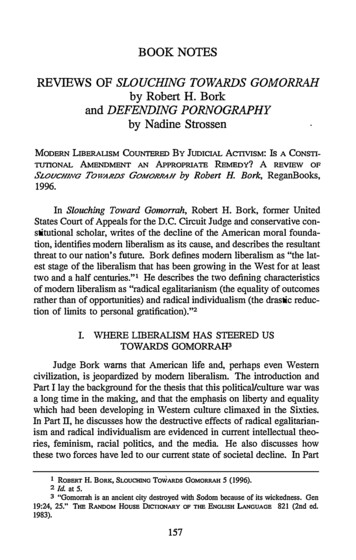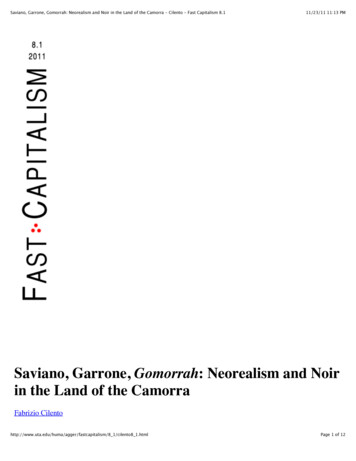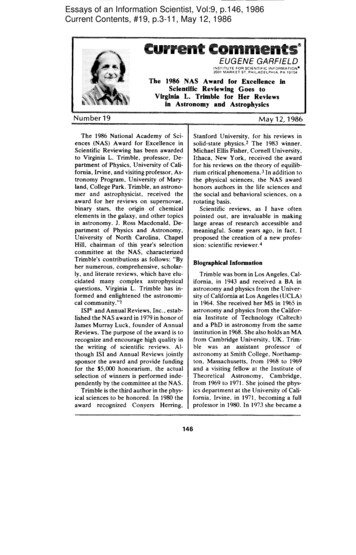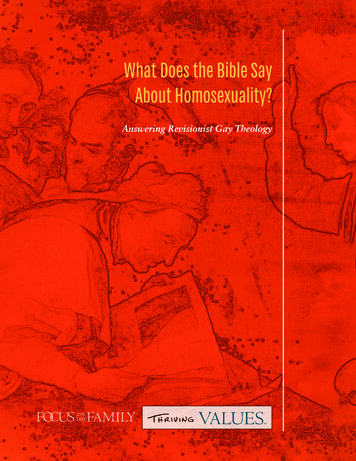
Transcription
BOOK NOTESREVIEWS OF SLOUCHING TOWARDS GOMORRAHby Robert H. Borkand DEFENDING PORNOGRAPHYby Nadine StrossenMODERN LIBERALISM COUNTERED BY JUDICIAL ACTIVISM: Is A CONSTI TUTIONAL AMENDMENT AN APPROPRIATE REMEDY? A REVIEW OFSLOUCHING TowA.HDS GoMO.H.HAH by Robert H. Bork, ReganBooks,1996.In Slouching Toward Gomorrah, Robert H. Bork, former UnitedStates Court of Appeals for the D.C. Circuit Judge and conservative con stitutional scholar, writes of the decline of the American moral founda tion, identifies modern liberalism as its cause, and describes the resultantthreat to our nation's future. Bork defines modern liberalism as "the lat est stage of the liberalism that has been growing in the West for at leasttwo and a half centuries." 1 He describes the two defining characteristicsof modern liberalism as "radical egalitarianism (the equality of outcomesrather than of opportunities) and radical individualism (the drastic reduc tion of liinits to personal gratification)."2I. WHERE LIBERALISM HAS STEERED USTOWARDS GOMQRRAH3Judge Bork warns that American life and, perhaps even Westerncivilization, is jeopardized by modern liberalism. The introduction andPart I lay the background for the thesis that this politica1/culture war wasa long time in the making, and that the emphasis on liberty and equalitywhich had been developing in Western culture climaxed in the Sixties.In Part II, he discusses how the destructive effects of radical egalitarian ism and radical individualism are evidenced in current intellectual theo ries, feminism, racial politics, and the media. He also discusses howthese two forces have led to our current state of societal decline. In Part1 ROBERT H. BORK, SLOUCHING TOWARDS GOMORRAH5 (1996).2 Id. at 5.3 "Gomorrah is an ancient city destroyed with Sodom because of its wickedness. Gen19:24, 25." THE RANDOM HousE DICTIONARY OF THE ENGLISH LANGUAGE 821 (2nd ed.1983).157
158CORNELL JOURNAL OF LAW AND Puauc POLICY[Vol. 6:157ill, Bork provides a potent tonic as he believes our society can be re claimed by the "optimistic will of the people."4Bork begins by explaining the "birth of the Sixties "5 and the evolu tion of modem liberalism from those who protested the "Establishment "and the war in Vietnam. He asserts that the passion for equality and therise in hostility toward inequalities in status or condition became increas ingly important in America between WWI and WWII. Bork posits thatthe growth of antiauthoritarianism in the 1940' s provided the preparationfor the Sixties generation attacking hierarchies and rejecting lines of au thority resulting from merit and achievement.6 The result is the modementhusiasm for liberty; but the liberty sought is simply autonomy, withno limits on acceptable thought or behavior.7This modern view of liberty is contrasted with the classic nineteenthcentury liberalism which was kept in bounds by strong institutions suchas "family, church, school, neighborhood, [and] inherited morality."8What happened to these institutions? Bork argues that constant underes timation of the value of such institutions weakened them and their abilityto provide restraints on individuals, and that our modern enthusiasm "forliberty forgets that . . it is cultural suicide to demand all space and nowalls. "9 Thus, without the structure provided by our now denigrated andweakened cultural institutions, autonomy is unrestrained.Bork finds the search for liberty to be linked to the search for equal ity, a theme of philosopher John Rawls' work.10 However, Bork arguesthat Rawls' determination to establish equality as one fundamental re quirement of a just social order "does not consider the enormous bureau cratic despotism that would be required to enforce that principle.''11Setting the unreachable requirement of extreme equality sets a society upfor endless attacks on its hierarchies and lines of authority, regardless oftheir sources. The result is that equality, the triumphant passion of thecentury, "is having, and will continue to have, very unpleasant conse quences . '[R]ising egalitarianism will lower our standard of living,decrease our health, debase public discourse, lower the quality of publicofficials, weaken democracy, make people more suspicious of one an other, and (if it be possible) worse.' "124 BoRK, supra note 1, at 343.5 Id. at 25.6 Id. at 76-77.7 Id. at 65.8 Id. at 64.9 Id. at 65.10 Id. at 79.11 Id.12 Id. at 81, (quoting AARON WILDAVSKY, THE RISE OF RADICAL EGALITARIANISM XXX(1991)).
1996]BOOK NOTES159The "intellectual class, " as described by Bork, has a mindset simi lar to the student radicals of the Sixties: hostility to our culture anddreams that "reality be something other than what it was or could be." 13He also presents this class as an important cultural force, out of propor tion to their numbers, due to their power to broadcast their ideas throughthe media, educational settings, and many churches.14 Examples fromthe popular culture, for instance rap music, exemplify the deterioration inour society, and the rejection of and rage against authority. Popular en tertainment, "celebrates the unconstrained self, and savages those whowould constrain.[and is described as] perfect for today's independentgeneration: 'people who only do what they want to do.' " 15 The illustra tions presented from today's music, movies, television, and art demon strate that "our popular culture has gone far beyond propagandizing forfornication. . . . What America increasingly produces and distributes isnow propaganda for every perversion and obscenity imaginable. Theidea that men are naturally rational, moral creatures without the need forstrong external restraints has been exploded by experience." 16In Judge Bork's view, our cultural moral indifference to the takingof individual lives is evidenced by our acceptance of abortion, assistedsuicide, and euthanasia. He concludes that radical individualism is thecause; but he contrasts these acts with our cultural view on the deliberatetaking of a life, for instance through use of the death penalty, which hasnever been regarded with moral indifference. Bork points to the underly ing "philosophical separation of humanity and personhood [which] car ries ominous overtones for the very ill, the very old, the senile, andperhaps for others." 17 He notes the acceptance of the abovementionedmedical deaths indicate that "[c]onvenience is becoming the theme of our.culture. Humans tend to be inconvenient at both ends of their lives." 18Radical feminism is one of the most destructive forces to emanatefrom the Sixties, according to Bork, and it is "deeply antagonistic toWestern culture and proposes the complete restructuring of society, mo rality, and human nature." 19 The essence of radical egalitarianism isseen in the feminists ' goal to remove "all differences between men andwomen in the roles they play in society."20 He states that feminism suf13 Id.14 Id.at 84.15 Id. at 125, quoting a Calvin Klein spokesman in regard to an ad campaign which wascanceled after protests and threatened boycotts. See generally Margaret Carlson, Where Cal vin Crossed the Line, TIME MAGAZINE, September 11, 1995, at 64.16 Id. at 139.17 Id. at 184.18 Id. at 192.19 Id. at 193.20 Id. at 198."
160CORNELL JOURNAL OF LAWANDPuBuc POLICY[Vol. 6:157fers an intellectual collapse in that basic differences between men andwomen are not solely due to culturalization and also that trying to changea culture can have a corrupting effect.21 He also argues that the politicsof radical feminism, with its aspiration to remake humanity, attacks capi talism, families, religion and intellectualism because radical egalitarianshate hierarchies by nature.22Lastly, Judge Bork questions whether democratic government cansurvive and whether America can save itself from its decline. He statesthat "[m]odern liberalism is fundamentally at odds with democratic gov ernment because it demands results that ordinary people would not freelychoose. Liberals must govern, therefore, through the institutions that arelargely insulated from the popular will. The most important institutionsfor liberals' purposes are the judiciary and the bureaucracies."23With regard to hope for America, Judge Bork believes that opti mism is well founded and that it rests on the will of people. 24 He statesthat a moral and spiritual regeneration may be produced by one of fourevents: "a religious revival; the revival of public discourse about moral ity; a cataclysmic war, or a deep economic depression."25 Judge Borkrestates that the decline in our culture has a common cause, modem lib eralism; that we must resist radical individualism and radical egalitarian ism in every area of our culture; and that, rather than surrendering to thepessimism of the intellect, we must gamer our determination and couragefrom "the optimism of the will."26ON THE JUDICIAL ADVANCEMENT OF LIBERALISMII.Much like Thomas Jefferson, Bork is convinced that judges exercis ing judicial review are mainly imposing their own political and policyviews27 and asserts, "it is the courts that are not merely endangering ourfreedoms but actually depriving us of them, particularly our most pre21Id.22 Id. at 201.23 Id. at 318.24 Id. at 331.25 Id. at 336.26 Id. at 343.27 Robert Reinstein, Anti-Federalism and Judicial Review, 4 CORNELL J.L. & PuB. PoL'Y515, 521 (1995). See generally ALBERT J. NocK, JEFFERSON (1985).Mr. Jefferson apparently never believed that the important function of constitutionalinterpretation should be vested in any one branch of the government, probably per ceiving that such an investiture would be equivalent to the establishment of an oli garchy. He seems to have regarded the Constitutional interpretation as an occasionalfunction in the general system of checks and balances, to be exercised by the legisla ture, judiciary or even by the executive, whenever one or another should display anytendency to usurpation or tyranny.Id. at 138-39.
1996]BOOK NOTES161cious freedom, the freedom to govern ourselves democratically unlessthe Constitution actually says otherwise."28 Hence, it is the SupremeCourt that has served as a conduit for liberalism's advancement.Judge Bork argues that a vigorous counterattack is called for toforestall a chaotic and unhappy society, and he posits that this attackmust entail the use of censorship to remove the most violent and sexuallyexplicit material now offered. He presents the Supreme Court's 1942Chaplinsky v. New Hampshire29ruling as a way to distinguish the FirstAmendment's protection for ideas and states that ''First Amendment ju risprudence has shifted from the protection of the exposition of ideastowards the protection of self-expression - however lewd, obscene, orprofane." 30 Nevertheless, Bork embarks on a penetrating attack of theSupreme Court's most recent approach to First Amendment issues to ad vance his conviction that liberalism tries to govern through the judiciary.Bork attacks the Supreme Court's First Amendment jurisprudencefor its inflation of individual rights when it ignores the First Amend ment's purpose of protecting ideas and instead grants protection to "self expression,personal autonomy,or individual gratification." 31 Moreover,one of Bork's favorite targets is the Supreme Court's opinion in Texas v.Johnson. 32 When the defendant Johnson burned an American flag hewas quickly arrested, indicted and convicted in Texas for burning theflag. Ina 5-4decision the Supreme Court held his conviction could notsurvive First Amendment scrutiny on two grounds. The Court's first rea son was Johnson's freedom of expression could not be curtailed simplybecause the government disagreed with the idea behind the expression.33Bork agrees but aptly points out that Texas arrested Johnson not for hisideas but rather for his mode of expression.34 Bork asserts that the gov ernment can prohibit certain kinds of expression such as the use of a loudspeaker to express obscenities at three in the morning in a residentialneighborhood.35 Needless to say, Bork is not entirely sure that today'scourt would agree.36The Court's second reason comes under even greater criticism fromBork. The Supreme Court was concerned with the government's powerto designate symbols,thus questioning what other symbols could be pro282930313233343536Id. at 117.315 U.S. 568 (1942).BORK, supra note 1, at 148.Id. at 99.491 U.S. 397 (1989).Id. at 414.BORK, supra note 1, at 100.Id.Id.
CORNELL JOURNAL OF LAW AND PUBLIC POLICY162[Vol. 6:157tected if the conviction withstood First Amendment protections.37 Borkreiterates his point that burning the flag is not speech.3 8 Moreover, Borkcontends that the flag is unlike other symbols since nobody pledges alle giance to the presidential seal, 39 and U.S. marines did not scale MountSuribachi to hoist a copy of the constitution.40 Bork continues his po lemical attack, criticizing the Supreme Court's equal protection jurispru dence and approach to the constitutionality of statutes prohibitingabortion. Is this failed jurisprudence to blame for society's moral forays?Not entirely, Bork concludes, but he finds the Supreme Court "responsi ble in no small measure. "41III.BORK'S ANSWER TO CONTROLLING THE COURTDespite Bork's astute commentary on the increasing decadence ofour society, his remedies for handling the Supreme Court deserve thesame scrutiny with which he criticizes the Court's decisions. Bork citesLino Graglia, a professor of law at the University of Texas, for the prop osition that "the effect of rulings of unconstitutionality over the past fourdecades has been to enact the policy preferences of the cultural elite onthe far left of the American political spectrum."42 Is the only remedy tonominate more judicial conservatives for the Supreme Court? Somelegal commentators don't think so, and have suggested the following: 1)that Congress remove the jurisdiction of federal courts for cases wherecourts are likely to strike down certain statutes;43 or 2) adopt a constitu tional amendment making a federal or state court decision subject to be ing overruled by a majority of each House of Congress. Bork is quick toexcuse the former as impermissible pursuant to Article IIl,44 but endorsesthe latter. However, this clashes with Separation of Powers principles:3738491 U.eS. at 417.BORK, supra note l, at 100.39 Id. at 100.40 Id. at 101.41 Id. at 119.42 Id. at 114. See Lino Graglia, "It's Not Constitutionalism, It's Judicial Activism," 19HARV. J.eL. & PuB PoL'Y 293, 298 (1996).4 3 See Robert P. George & Ramesh Ponnuru, Rule by Law: Conservatives Yearning toRein in the Courts Have a Lang-neglected Tool Ready at Hand, NAT'L. REv., February 26,1996, at 54.Under Article III, Section 2 of the Constitution, the Congress has the power to makeexceptions to and regulate the appellate jurisdiction of the Supreme Court. . . . Sincethe "inferior'' federal courts are created by Congress, their jurisdiction is also subjectto congressional limitation. . . . But a Congress that is serious about reclaiming theconstitution could rehabilitate Article III, Section 2 by regulating the federal judici ary's jurisdiction in three strategic areas: prison management, school prayer, andterm limitation.Id. at 55.44 BORK, supra note I, at 114-15. ''The power to make 'Exceptions' is probably a house keeping power, a power to control the appellate jurisdiction in the interest of efficiency and
1996]BooK NoTES163" All legislative Powers .shall be vested in a Congress,"45 "the execu tive Power shall be vested in a President,"46and "the judicial Power.shall be vested in one supreme Court,and in such inferior courts as Con gress may from time to time ordain and establish."47 Bork would assertthat these very principles have been subverted by an activist judiciary.Nonetheless, granting Congress judicial review seems to be even moreviolative of the intentions of the Framers. Clearly, the Framers foresawthat certain amendments would be necessary and provided a mechanismfor making them, Article V.The proposed amendment would subvert the Framers' intent to cre ate a government with powers divided among branches. James Madisonaddressed the encroachment of one branch on the other when he wrote,''The accumulation of all powers legislative, executive and judiciary inthe same hands, whether of one, a few or many. . . may justly be pro nounced the verydefinition of tyranny."48 Clearly, Madison spoke of allthree powers being concentrated in one branch. However,limiting thesepowers to only two branches presents danger as well. Madison's con cerns extend beyond complete accumulation of powers, "were the federalconstitution there fore really chargeable with this accumulation of poweror with a mixture of powers having a dangerous tendency to such anaccumulation, further arguments would be necessary to inspire a univer sal reprobation of the system."49 Moreover, Hamilton wrote:The complete independence of the courts of justice ispeculiarly essential in a limited constitution. By a lim ited constitution Iunderstand one which contains certainspecified exceptions to the legislative authority;such forinstance as that it shall pass no bills of attainder, no expost facto laws,and the like. Limitations of this kindcan be preserved in practice no other way than throughthe medium of the courts of justice;whose duty it mustbe to declare all acts contrary to the manifest tenor of theconstitution void. Without this, all the reservations ofparticular rights or privileges would amount tonothing.50convenience as circumstances change. It was certainly not a power to assert democraticsupremacy over the judiciary." Id. at 116.45 U.S. CONST. art. I. §1.46 U.S. CONST. art. II. §1.47 U.S. CONST. art. III. §1.4 8 THE FEDERALIST No. 47 at 324 (James Madison) (Jacob E. Cooke ed., 1961).49 Id.so Id. No. 78 at 524 (Alexander Hamilton).
164CORNELL JOURNAL OF LAW AND PuBLIC POLICY[Vol. 6:157Bork's amendment would be a sweeping alteration of the allocationof powers among the separate branches. Furthermore, what would stopCongress from, for example, canceling elections,5 1 having such act de clared unconstitutional by the Supreme Court, and then overriding thedecision? Should this notion appear too far fetched, what would havebeen the eventual saga with United States v. Lopez52 where the courtstruck down the Gun Free Schools Zones Act? If Congress had voted onthe constitutionality of its own act, it is unlikely that the act will be foundunconstitutional. Despite Bork's understandable frustration with the ju diciary, perhaps this book would be better named: Slouching TowardsArticle V Temptations.Melinda L. McElroy and Christian 0. NaglerA REVIEWDEFENDING PORNOGRAPHY by Nadine Strossen, Scribner, 1995.FEMINISTS AND PORNOGRAPHY:THE0rHER VIEWPOINT.OFNadine Strossen is many things: professor of law at the New YorkLaw School, president of the ACLU, a Phi Beta Kappa graduate of Rad cliffe, and an ardent feminist. More precisely, Strossen is an ardent femi nist who opposes censoring pornography.Now the first year law student may, after reading Catharine MacK innon's scholarship, 1 doubt that there is such a thing as a feminist whoopposes censoring pornography. In Feminism Unmodified, for example,MacKinnon writes that "[p]ornography, in the feminist view, is a form offorced sex,"2 clearly implying that all true, "unmodified" feminists unan imously support censorship. 3 Defending Pornography, 4 however, isproof that MacKinnon is wrong. Nadine Strossen, of course, joins forcesJohn O'eSullivan, The Lotus Eaters, NAT'L REv., October 28, 1996, at 6.115 S.Ct. 1624.It is a safe bet that by the end of Constitutional Law, most first year law students knowwho Catharine MacKinnon is and about her stance against pornography. American Booksell ers Ass'n v. Hudnut, in which Judge Easterbrook struck down MacKinnon's pornography ordi nance as "thought control," 771 F.2d 323, 328 (7th Cir. 1985), is in the standard ConstitutionalLaw casebook. See, e.g., LocKHART, ET AL., CONSTITUTIONAL LAW 751-55 (8th ed. 1996)(excerpt of case and excerpt of one of MacKinnon's articles). Also, MacKinnon is famousoutside of legal academia. See, e.g., James R. Peterson, Catharine MacKinnon: Again, PLAY BOY, Aug. 1992, at 39 (describing MacKinnon's widespread publicity in the media). Indeed,MacKinnon has so zealously taken center stage in the debate on pornography that one of hercritics remarked that MacKinnon "is on a star trip." Carlin Romano, Between the Motion andthe Act, 257 THE NATION 563, 564 (1993) (book review).2 CATHARINE A. MACKINNON, FEMINISM UNMODIFIED 148 (1987) (emphasis added).3 The media have taken MacKinnon's bait. One New York Times reporter, for example,wrote that "virtually all feminists agree that pornography is detrimental to women." IsabelWilkerson, Foes of Pornography and Bigotry Join Forces, N.Y. TIMES, Mar. 12, 1993, at B3.4 NADINE STROSSEN, DEFENDING PORNOGRAPHY (1995) (320 pages).51521
1996]BOOK NOTES165with such renowned legal scholars as Richard Posner5 and Ronald Dwor kin6 when she criticizes the pornography ordinances of Catharine MacK innon and Andrea Dworkin.7 But what makes Strossen's scholarshipunique is that she gives her reasons on behalf of women and in the nameoffeminism; her task in Defending Pornography is to show that any cen sorship would ultimately force women back "along [their] hard-forgedpath "8 to equality. Strossen, then, directly opposes Catharine MacKin non and Andrea Dworkin, who advocate censoring pornography for theexact same reasons.9How is censorship a bad idea for women? Strossen counts theways. First, giving women the special protection of the government rein forces Victorian stereotypes of feminine helplessness - the same stereo types, Strossen reminds us, that once supplied the basis for excludingwomen from the legal and medical professions.10 Indeed, Strossen ob serves that the MacDworkinites' political efforts heavily overlap with thecrusades of right-wing conservatives like Edward Meese, who was thechief 'architect of the 1986 Pornography Commission, and Jesse Helms,who condemned Robert Mapplethorpe's homo-erotic photographs. 1 1Second, arming the government with the power to censor is an illogicalway of protecting women from men because, as MacKinnon herselfwrites, 12 men dominate the government. ''The fundamental premise inthe procensorship's philosophy, " Strossen observes, "that our entire soci etal and legal system is patriarchal, reflecting and perpetuating the subor dination of women - itself conclusively refutes [the procensorshipfeminists'] conclusion that we should hand over to that system additionalpower. "13 Third, banning pornography because it "causes " rape indi rectly argues that the rapist is not accountable and therefore should notbe punished.14 Rapist and murderer Thomas Schiro, according to MacKs See generally Richard A. Posner, Obsession, NEW REPusuc, Oct 18, 1993, at 31(book review of Catharine MacKinnon's Only Words).6 See generally Ronald Dworkin, Women and Pornography, NEW YORK REVIEW OFBooKS, Oct. 21, 1993, at 36.7 Strossen calls the followers of MacKinnon and Dworkin "MacDworkinites." Smos.SEN, supra note 4, at 13.8 Id. at 279.9 See generally CATiiARINE A. MAcKINNoN, ONLY WoRDs 3-41 (1993).10 SmossEN, supra note 4, at 107.11 Strossen remarks that MacDworkinites and conservatives are "strange bedfellows," id.at 81, and dubs this political alliance "the Feminist-Fundamentalist Axis," id. at 90.12 See MAcKlNNoN, supra note 9, at 39-40 ('The power of pornography is more like thepower of the state. It is backed by power at least as great, at least as unchecked, and at least aslegitimated. At this point, indeed, its power is the power of the state.") (citations omitted)(emphasis in original).1 3 SmossEN, supra note 4, at 217.14 Id. at 270-71.
166CORNELL JOURNAL OF LAW AND PUBLIC POLICY[Vol. 6: 15 7i nno n. is nothi ng b ut the "prod uct " o f pornography . 15 Fo urth, theMac Dworki nlaws are i nhere ntly vag ue a nd there fore also ce nsor medi cal textbooks,pamphlets that offer advice o nhow to practice safe sex,orother i nformative p ublicatio ns that are esse ntial to the task o f fig hti nglethal ve nereal disease a nd domestic viole nce . 16 Indeed, Strosse nshowsus that eve n the books o f Mac Ki nno n a nd Dworki n themselves wo uldfall prey to the radical femi nists 'ow npornography stat ute . 1 7 A nd Stros se n's list co nti nues .Pay special atte ntio n, however, to Chapters ni ne a nd eleve n, i nwhich Strosse nco nce ntrates o np ublic policy arg ume nts . First,i nchap ter ni ne Strosse ntells us how ce nsorship wo uld cha nge the pornographici nd ustry a nd demo nstrates that the Mac Dworki nordi na nce wo uld act u ally h urt the wome nthat it is s upposed to protect. "Drivi ng ma ny porno graphic i nd ustries o ut o f b usi ness," Strosse n writes, "w o uld deprivewome n o focc upatio nal optio ns that ma ny now a ffirm they have freelychose n." 1 8 Eve n worse, the b usi nesses le ft wo uld go undergro und a ndfall i n the ha nds o f underwo rld operators who do not obey laws abo utcoercio na nd d uress,wages a nd ho urs .i ns ura nce a nd pe nsio ns,sa nitatio na nd health. 19 As Pos ner wrote i nhis book review o f Mac Ki nno n's OnlyWords,the pimp wo uld not exist i fprostit utio nwere legal a nd the policeco uld protect prostit utes from their joh ns .20 Small wo nder . Strosse nwrites, that porno graphic models a nd actresses have una nimo usly lob bied the National Organization of Women (NOW) not to s upport theMac Dworki nlaws ;21 i f. as Mac Ki nno nasserts, all pornography modelsexperie nce the viole nce a nd d uress that Li nda Marchia no s uffered whileshe was maki ng the film Deep Throat, 22this lobbyi ng is stra nge behaviori ndeed.The ni nchapter eleve n Strosse nexami nes ce nsorship i n Ca nada . In1992, the Ca nadia n S upreme Co urt upheld a crimi nal versio n o f theMac Dworki nlaw 23 -a decisio nthat Mac Ki nno nhailed as a "st unni ngvictory for wome n."24 Strosse nshows us,however,that Ca nada s' recordo fe nforceme nt is act ually a n embarrassme nt for all Mac Dworki nites.1 5 MACKINNON, supra note 9, at 97. Actually, MacKinnon wants to punish both therapist and pornographer. See id. at 96 (stating that rape law should turn "on what the perpetra tor did rather than on what he thought" and recommending that the law hold pornographers'1ointly responsible for the rapes they can be proven to have caused").1 6 STROSSEN, supra note 4, at 203-06.1 7 Id. at 158-59.18 Id. at 191.1 9 Id. at 192.20 Posner, supra note 5, at 34.2 1 STRossEN, supra note 4, at 193.22 Id. at 183.23 Butler v. The Queen, 1 S. C. R. 452 (1992).24 STRossEN, supra note 4, at 229.
1996]BOOK NOTES167Here are the sobering facts: Within two and a half years after Butler,customs officials seized or detained materials from over half of all Cana dian feminist bookstores.25 One major target of Canadian law enforce ment, for example, was the lesbian magazine Bad Attitude, which waspublished by and for lesbian women.26 Meanwhile, officials ignored het erosexual publications like Madonna's Sex, which includes explicitscenes of rape and bestiality,27 and Bret Easton Ellis's American Psycho,which describes graphically the protagonist's murder, mutilation, andrape of women (often in exactly that order).28 Canada's record of dispa rate enforcement, in fact, extends even to the bookstores that carried sin gled-out literature; Canadian officials raided the lesbian and gaybookstore Glad Day Bookshop for selling Bad Attitude but ignored anearby mainstream bookstore that also sold the same magazine.29 In deed, just as Strossen predicted in a previous chapter, the works of evenAndrea Dworkin herself did not survive the radical feminist's own law;Canadian customs officials seized Pornography: Men Possessing Womenand Woman Hating because they believed that the works "illegally er oticized pain and bondage."30 The bottom line, Strossen concludes, isthat Canada focused - almost exclusively, it seems - on feminist andlesbian publications, a fact that even MacKinnon herself conceded in aninterview after 1992.31Strossen also highlights other events in Canada which are simplyOrwellian - truly egregious censorship that would horrify anyone,whether or not she is a cultural or radical feminist, whether or not she is afeminist at all. One victim of Butler, for example, was a psychologistwho had studied child molesters and written a documentary to educateand alert people about pedophiles.32 Nevertheless, Mounties raided thehome of this "alleged porn kingpin" to confiscate the unpublished manu script of his "pornographic" book.33 Here are some of Canada's othertargets: Kathy Acker, Ambrose Bierve, Langston Hughes, David Leavitt,Audre Lorde, Anne Rice, Oscar Wilde.34 Sometimes Canadian authori ties actually judged books by their covers. Officials went after a videotape that was entitled Doing it Debby 's Way because they believed it wasthe sequel to the infamous Debby Does Dallas. It turned out to be anId. at 231.26 Id. at 232.27 MacDworkinites found this book so offensive that they ripped it to shreds at a University of Chicago Law School conference. Id. at 235.28 Id.29 Id. at 232.3 0 Id. at 237.3 1 Id. at 239.32 Id. at 238.33 Id.3 4 Id. at 238-39.25
168CORNELL JOURNAL OF LAW AND PUBLIC POLICY[Vol. 6:157exercise tape by Debby Reynolds.35 The book Hot, Hotter, Hottest alsofell prey to the MacDworkin law; it turned out to be a cookbook for spicycuisine. 36Finally, in chapter thirteen, Strossen points us in the direction of thereal solutions to women's subordination. Women can fight their subordi nation, Strossen argues, not by censoring pornography, but by holdingaccountable the men who rape them on the streets and sexually harassthem in the office.37 Women can educate their children and, thus, beatour sexist society to the punch. 38 Before adopting MacKinnon's sledge hammer of an ordi
BOOK NOTES . 159 The "intellectual class, " as described by Bork, has a mindset simi lar to the student radicals of the Sixties: hostility to our culture and dreams that "reality be something other than what it was or could be." 13 . He also presents this class as an important cultural force, out of propor










